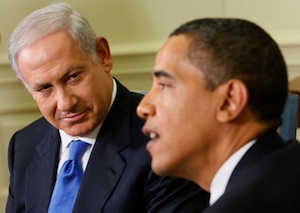Fresh off of a hugely hopeful round of nuclear talks in Geneva and just weeks ahead of more talks, the prospect for a deal between Iran and the P5+1 seems much more realistic than it has in years past. Even the US, long the least negotiation-friendly of the P5+1, seems to be warming to the chance.
 That’s not sitting well with Israel, however, and the talks are not only prompting the usual war rhetoric from Israeli leadership, but growing expressions of displeasure at the US, and signs of a developing rift.
That’s not sitting well with Israel, however, and the talks are not only prompting the usual war rhetoric from Israeli leadership, but growing expressions of displeasure at the US, and signs of a developing rift.
Netanyahu is making the rounds again in the US press, downplaying the prospects of a deal with Iran and ruling out agreeing to ease international sanctions against Iran unless they unilaterally give up the whole of their civilian program.
The idea that the Israeli prime minister has a de facto veto over the sanctions, particularly in the US, rests on the US Congressional opposition to easing sanctions without an Israeli imprimatur. So far, that assumption appears solid, with many Senate hawks still pushing for new sanctions despite the diplomatic progress, and eagerly citing Israel as the region why.
Selling Israel on the rapprochement in therefore a key part of any deal with Iran, and US and British delegations have been intensely meeting with Israeli officials trying to convince them of the merits of a deal.
So far it’s not been an easy sell, and the Netanyahu government has made it clear they’re quite comfortable with continuing the decades of acrimony toward Iran, and it’s going to take an awful lot to convince them otherwise.


